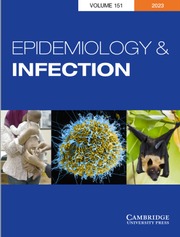Article contents
Isolation and cultivation of bovine ephemeral fever virus in chickens and chicken embryos
Published online by Cambridge University Press: 15 May 2009
Summary
Unadapted bovine ephemeral fever (BEF) virus was isolated from cattle blood after intravenous inoculation into chicken embryos. Infected embryos died or hatched as abnormal chickens. The chick embryo was slightly less sensitive to unadapted BEF virus than were Vero cell cultures, but the use of embryos avoids the several blind passages that are required to isolate BEF virus in unweaned mice. Chick embryos were considerably less efficient than Vero cell culture or unweaned mice in detecting Vero cell-adapted and mouse-adapted BEF virus respectively.
Viraemia was demonstrated in chicken embryos at 1–4 days and in one-day-old chickens at 1–3 days after intravenous inoculation of BEF virus. BEF virus was demonstrated by isolation and by immunofluoresence in heart, brain, lung and liver of chicken embryos at 1–5 days and in lung and liver of one-day-old chickens at 1–2 days, after intravenous inoculation. The isolated viruses were confirmed as BEF virus by neutralization with immune mouse ascitic fluid. BEF neutralizing antibodies were produced in 4-week-old and adult chickens after intravenous inoculation with BEF virus.
- Type
- Research Article
- Information
- Copyright
- Copyright © Cambridge University Press 1978
References
REFERENCES
- 2
- Cited by


